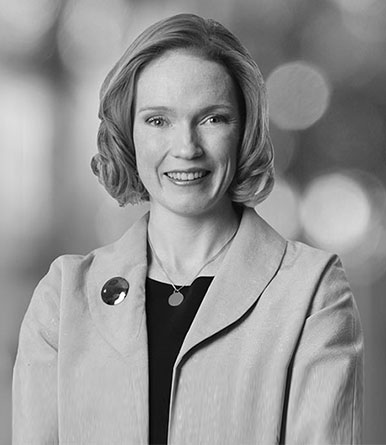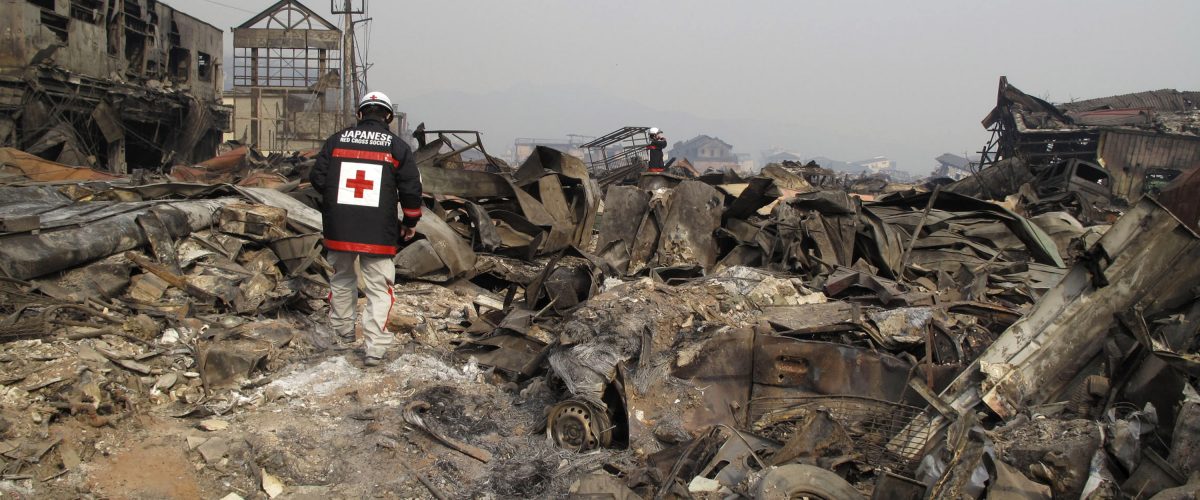Preparing for an emergencyx
Focus on the International Federation of Red Cross and Red Crescent Societies.

“The project started last summer when we worked with the IFRC to develop a conceptual framework, key indicators and categories for the index.”
REBECCA CAMPBELL, PARTNER
The International Federation of Red Cross and Red Crescent Societies (the IFRC) is the world’s largest humanitarian organization. In one year alone it typically responds to more than 600 major disasters through its network of 97 million staff, volunteers and supporters. The Reporter finds out more about our recent and historical support of this renowned organization.
The IFRC is active in 190 countries and provides assistance to all, regardless of nationality, race, religious beliefs, class or political opinions. Given this truly global footprint, it’s also a perfect match for the Firm.
No surprise then that White & Case has been working with the cause since World War I, when George Case was appointed by President Woodrow Wilson to the American Red Cross’s War Council as legal advisor.
Since then, the century-long relationship has flourished and, most recently, we’ve been helping them on two major projects aimed at preventing and alleviating human suffering worldwide.
The first is the development and operation of a Global Disaster Risk Management (DRM) Law Index, which will be used to rank countries based on their ability to deal with major disasters. This work is being led by partner Rebecca Campbell, together with Matthew Richards, Bandar Altunisi and Naim Nasser.
Rebecca explains: “The project started last summer when we worked with the IFRC to develop a conceptual framework, key indicators and categories for the index.
“They wanted the index to help countries get an idea of how well prepared they are legally to respond to major disasters, such as an earthquake or tsunami.
“For instance, do they have an operational plan or specialist department in place, do they have funds set aside, and do they have the legal tools to mobilize forces?
“Can they use emergency powers to use private facilities if necessary and what legal responsibility have companies and organizations been given to make sure they are prepared and have the proper training and risk management in place?”
Raising awareness
Having agreed the concept and framework of what would be measured in the index, we’ve since started to work with the IFRC with the aim to research and fill in surveys for around 200 countries around the world.
The results will be collated, with each country then scored and ranked on the index from best to least prepared. The finished Global DRM Index will be published and released by the IFRC later this year.
Matthew Richards says: “The aim of the index is primarily to raise awareness of the need for countries to prepare themselves for major disasters and to help them benchmark themselves, so they can see what they need to do to improve.
“Ultimately, it is about saving lives and minimizing suffering by helping countries develop and introduce robust DRM laws.”
Empowering first aid
Our work on the DRM Index has involved a substantial undertaking and commitment, involving lawyers from many offices worldwide and taking hundreds of hours.
The same is true for the other project we’ve been working on with the French Red Cross, which aims to help countries and states remove legal barriers that may deter non-professionals to carry out emergency first aid.
Paris-based partner Bertrand Liard, who is leading on the project, explains: “The French Red Cross recognizes that trained but non-professional first aiders are sometimes discouraged from helping because of the potential legal liability if they administer treatment.
“So we agreed to help the French Red Cross with global research to build a comprehensive picture of the legal liabilities that apply in countries worldwide and see what could be done to encourage states to provide legal protection and make first aiders aware of it.”
The Firm worked with the French Red Cross to develop a 10-question survey, which is being completed for around 70 states by a team including 55 associates and 14 partners from 20 offices across the network.
A united effort
Bertrand says: “This has been another impressive team effort involving lawyers from around the world. When Global Pro Bono Manager Patrick Rickerfor sent out a request asking for people to volunteer to help the response was amazing.
“Particular thanks to Rekha Ajoodha and Janine Howard of our Johannesburg office, who took on responsibility for overseeing the distribution and collation of the surveys, which continues into Q1.”
The final report should be complete in Q2. It will identify the dos and don’ts of first aider’s liability, and classify each country or group of countries according to its legal regime, to assist the client with identifying legislation and countries they may focus on.
Bertrand says: “These two projects illustrate how our global footprint can make a real impact around the world.
“Not only will this work strengthen our already strong relationship with the French Red Cross and IFRC, but most importantly it will benefit people and, potentially, save lives.
“It also reflects our values and ethics as a law firm.”





